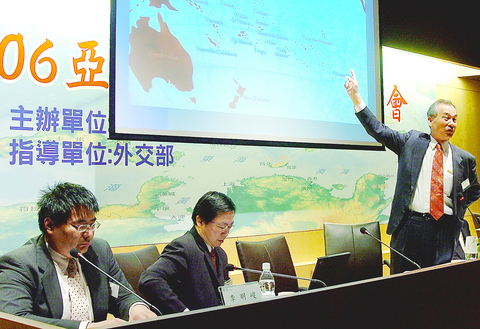With India's increasing influence in the South Asian region, Taiwan might want to extend its "go south" policy to include that country and seek more economic and political cooperation with the developing economy, a top official at the National Security Council (NSC) said yesterday.
"The world is observing the warming relations between the US and India, especially the most recent US-India nuclear agreement, which US President George W. Bush hopes the US Congress will endorse despite the fact that India has not signed the UN's nuclear Non-Proliferation Treaty," council Deputy Secretary-General Parris Chang (
"India sees China as its biggest threat in the region and its alignment with the US reflects a change of course in its foreign policy," he said.

PHOTO: CHU PEI-HSIUNG, TAIPEI TIMES
Chang made the remarks on the last day of the Asia-Pacific Peace Watch conference in Taipei.
The two-day symposium was organized by the Taiwan Peace Foundation. While the first day of the forum focused on the security situation in Northeast Asia, the Taiwan Strait and Southeast Asia, the second centered on South Asia and the South Pacific.
Chang, who chaired the South Asia session yesterday, said that India's ambition to become one of the dominant powers in the region hinged on its relationships with the US and China.
In addition to building closer relations with the US, India last April agreed to forge a strategic relationship with Beijing.
Chen Han-hua (
What Taiwan can do to help is to provide South Asian countries with petrochemical technology, Chen said.
Chen also warned India of the dangers of dealing with the Chinese authorities, pointing out that China is very good at adopting the approach of "using warm water to cook frogs," meaning that the frog does not realize it is dying because it grows used to the warm temperature.
Senior adviser to the president and former vice premier Wu Rong-i (
Wu also emphasized that Taiwan had to become a stronger country before conducting talks with China.
"That is why it is so important for the legislature to pass the arms procurement plan as soon as possible," he said.
Analyzing China's influence in the South Pacific, Chang Yu-chang (
First, China wanted to buy diplomatic relations and isolate Taiwan, he said.
Chang said that China had invested US$4 million to build a stadium in Fiji and US$15.5 million to construct a swimming pool there.
China's generous contributions had won Chinese Premier Wen Jiabao (溫家寶) a ticket to attend this year's China-Pacific Island Countries Economic Development and Cooperation Forum Ministerial Conference in Fiji in April, he said.
Second, China wanted to invest in natural resources in the region, he said.
Chang said that China had obtained the consent of Austria to obtain uranium from that country.
Finally, China wanted to mold the South Pacific to its own strategic requirements in order to counter the US in the region, Chang said.

‘DENIAL DEFENSE’: The US would increase its military presence with uncrewed ships, and submarines, while boosting defense in the Indo-Pacific, a Pete Hegseth memo said The US is reorienting its military strategy to focus primarily on deterring a potential Chinese invasion of Taiwan, a memo signed by US Secretary of Defense Pete Hegseth showed. The memo also called on Taiwan to increase its defense spending. The document, known as the “Interim National Defense Strategic Guidance,” was distributed this month and detailed the national defense plans of US President Donald Trump’s administration, an article in the Washington Post said on Saturday. It outlines how the US can prepare for a potential war with China and defend itself from threats in the “near abroad,” including Greenland and the Panama

A wild live dugong was found in Taiwan for the first time in 88 years, after it was accidentally caught by a fisher’s net on Tuesday in Yilan County’s Fenniaolin (粉鳥林). This is the first sighting of the species in Taiwan since 1937, having already been considered “extinct” in the country and considered as “vulnerable” by the International Union for Conservation of Nature. A fisher surnamed Chen (陳) went to Fenniaolin to collect the fish in his netting, but instead caught a 3m long, 500kg dugong. The fisher released the animal back into the wild, not realizing it was an endangered species at

The Chinese Nationalist Party (KMT) is maintaining close ties with Beijing, the Democratic Progressive Party (DPP) said yesterday, hours after a new round of Chinese military drills in the Taiwan Strait began. Political parties in a democracy have a responsibility to be loyal to the nation and defend its sovereignty, DPP spokesman Justin Wu (吳崢) told a news conference in Taipei. His comments came hours after Beijing announced via Chinese state media that the Chinese People’s Liberation Army’s Eastern Theater Command was holding large-scale drills simulating a multi-pronged attack on Taiwan. Contrary to the KMT’s claims that it is staunchly anti-communist, KMT Deputy

The High Prosecutors’ Office yesterday withdrew an appeal against the acquittal of a former bank manager 22 years after his death, marking Taiwan’s first instance of prosecutors rendering posthumous justice to a wrongfully convicted defendant. Chu Ching-en (諸慶恩) — formerly a manager at the Taipei branch of BNP Paribas — was in 1999 accused by Weng Mao-chung (翁茂鍾), then-president of Chia Her Industrial Co, of forging a request for a fixed deposit of US$10 million by I-Hwa Industrial Co, a subsidiary of Chia Her, which was used as collateral. Chu was ruled not guilty in the first trial, but was found guilty